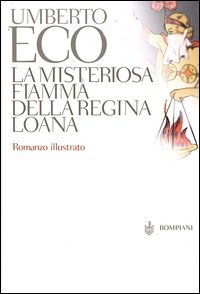
The publication of a novel by Umberto Eco is a big thing in my universe. After all, his ‘Foucault’s Pendulum’ is one of my all time favorite books. He is a master at mixing the arcane with the ordinary. So it was with a great deal of anticipation that I started reading his latest novel, ‘The Mysterious Flame of Queen Loana’. Unfortunately, the book has been a big disappointment.
The book deals mostly with the period of World War II although the main character is said to be living in the recent past. The novel is clearly autobiographical in parts as it reflects the experiences Eco underwent as a child, when he went with his mother to live in a village in the mountains of Piedmont, as well as his experiences of growing up in Fascist Italy under Mussolini.
The novel is about a Milanese old books dealer called Yambo, who loses episodic memory (the ability to recall events) due to a stroke. He wakes up in the hospital to realize that he does not remember anything about his adult life. He cannot recognize his wife, daughter or his friends. However, he finds that he has excellent recall for all the books he has read. He attempts to somehow get his memory back. With that intention he goes back to his childhood home in Solara where he discovers all the comics and records he used to read and listen to as a child during the pre-war and war years. However, he is unsuccessful in recalling anything although he does get to know through the above sources and through his old housekeeper how his life must have been during that time.
One day, in the attic of the house he unearths a sensational find, the First Folio of Shakespeare. The shock of the discovery gives him another stroke and he goes into a coma. In the coma, he begins to discover aspects of his childhood life in the region as well as his adolescent sweetheart whose name he knows but whose face he cannot recall. In the coma, using the literary characters he knows from his comic books he tries to divine her face. Does he get his memory back? Is he successful in recollecting his first big love’s face? Does he wake up? You will have to read the book to find that out but I had stopped caring by then.
The premise of the novel is interesting. The attempts of Yambo to get his memory back by surrounding himself with his childhood paraphernalia are intriguing. Up to this point you are eager to see how and if he will be able to regain his memory. But from that point on the novel degenerates into an infinitely long list of names of seemingly all the comics published in Italy (and in the Western world) during the pre-war and war eras. Mandrake, Phantom, Flash Gordon, Sandokan are some of the familiar names I recognized among a multitude of book titles, characters, villains and mysterious women.
The book has its moments, especially the instances where Yambo likens his memory loss to fog and cites various texts in which different writers talked about fog in different ways. But such moments are few and far between. The rest of the book is unfocused and rambles on from description of one obscure comic book/popular song to another interspersed with liberal sprinklings of how ordinary life was under fascist rule in Italy. The latter wherein Yambo lives through important childhood events again are the only parts of the novel that I enjoyed reading.
Perhaps my expectations had been very high as it was an ‘Eco novel’ or perhaps I could not adjust to the seemingly ‘mundane’ setting of the book compared to the fantastic and many layered plots of his earlier novels. Whatever the reason might be, at the end of the day, I just did not care for what happened to Yambo. And that, according to me, is the greatest failing of the novel. When the central character is cold and distant and you lose all concern for his life and actions you lose interest in the book as a whole. By concentrating more on the peripheral components of Yambo’s life Eco distances him from the reader and this results in Yambo coming across as wooden and aloof.
There is of course an abundant amount of intertexuality, which is a characteristic of all Eco novels. Eco quotes liberally from myriad sources and alludes to a thousand other. Trivia hunters can spend hours annotating this novel. However, in the end, it is perhaps an empty pursuit as the text itself offers no immediate pleasures.
According to some reports, apparently Umberto Eco has stated that this will be his last novel. Even though this book has been a disappointment, I hope he will change his mind and come up with a novel befitting his gift for telling fantastic tales. Tis no hyperbole, the world is a lesser place without the magic of Eco’s words to elevate it!
[-] Show Less





